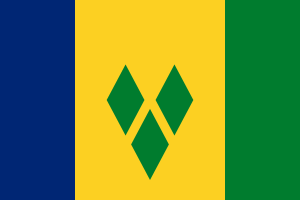James Fitz-Allen Mitchell
Sir James Fitz-Allen Mitchell KCMG PC MP (born 15 May 1931)[1] is the former Prime Minister of Saint Vincent and the Grenadines He was the second Prime Minister of Saint Vincent and the Grenadines and the founder of the New Democratic Party (NDP). He also served as Premier of the then colony of Saint Vincent from 1972 to 1974, and as Prime Minister of Saint Vincent and the Grenadines from 1984 to 2000.
Sir James Fitz-Allen Mitchell KCMG PC MP | |
|---|---|
 | |
| 2nd Prime Minister of Saint Vincent and the Grenadines | |
| In office 30 July 1984 – 27 October 2000 | |
| Monarch | Elizabeth II |
| Governor General | Sir Sydney Gun-Munro Sir Joseph Lambert Eustace Sir David Emmanuel Jack Charles Antrobus |
| Preceded by | Milton Cato |
| Succeeded by | Arnhim Eustace |
| 2nd Premier of Saint Vincent | |
| In office April 1972 – 8 December 1974 | |
| Governor | Rupert Godfrey John |
| Preceded by | Milton Cato |
| Succeeded by | Milton Cato |
| Leader of the New Democratic Party | |
| In office 3 December 1975 – 27 October 2000 | |
| Preceded by | Office Established |
| Succeeded by | Arnhim Eustace |
| Personal details | |
| Born | 15 May 1931 Bequia, Saint Vincent, Saint Vincent and the Grenadines |
| Political party | New Democratic Party |
| Alma mater | University of British Columbia |
Life and career
Sir James Fitz-Allen Mitchell agronomist and politician, has been a dominant figure in St. Vincent and the Grenadines for almost three decades. He was educated in St. Vincent at the St. Vincent Grammar School. He continued his education at the Imperial College of Tropical Agriculture in Trinidad and Tobago and at the University of British Columbia in Canada. An agriculturist by profession, Mitchell worked with Government and in the Ministry of Overseas Development in London, and as an agricultural research officer for the Saint Vincent Government.
Mitchell initially entered politics in 1966 by winning a legislative seat as a candidate of the Saint Vincent Labour Party. After serving as premier from 1972 to 1974, he founded the New Democratic Party (NDP) in 1975 becoming the sole Parliamentary Opposition until 1984. He became Prime Minister, Minister of Finance and Foreign Affairs in July 1984 and was re-elected for a fourth successive term when his Party scored a marginal 8–7 victory in the Parliamentary Elections of 15 June 1998. One of the longest serving prime ministers in Caribbean history, Mitchell retired as Prime Minister in 2000 but stayed on as Senior Minister until 2001. Mitchell was also foreign minister from 1984 until 1992 and a Privy Councillor beginning in 1985.
In addition, Mitchell was co-chair of International Democrat Observer teams in the first democratic elections in Nicaragua in 1990 and Hungary in 1991. He also led the Commonwealth observer team at the election in Lesotho in 2002.
Mitchell is currently a member of the InterAction Council.
Political positions
Mitchell has been a supporter of the Grenadines becoming a separate nation from St. Vincent.[2] Sir James is in favour of greater political integration of Caribbean countries. At the 8th Meeting of the Conference of Heads of Government of the Caribbean Community in 1987 he expressed the ultimate ideal when he said, "As I see it, we must have one flag, one anthem and freedom of movement of people, services and capital."
Role as agronomist
As a regional leader who helped to form the Caribbean Agricultural Regional Development Institute (CARDI) and as a professional agronomist, Sir James’s interest in agriculture has extended beyond the borders of his native land. In his opening address at the 1st Caribbean Agricultural Technology Conference (CATC) held in St Vincent and the Grenadines in 2000, his message was "agriculture must thrive" despite the challenges facing the regional sector.
He indicated that the demise of the regional banana industry would cause great social disruption, as various sectors of society (including farmers, transporters and suppliers of fertilizer) are dependent upon income generated from the industry. His policy was to create through land reform a property owning democracy by purchasing plantations, and allocating lands to the landless, while ensuring enhanced productivity and market opportunity. The Government of St Vincent and the Grenadines has therefore provided various incentives to promote banana production and diversification efforts. This includes the formation of land policy, which provides land for the landless as a means of building ownership, while increasing productivity.
Notwithstanding his public duties, he has published articles and books on agriculture, including studies on fungicide usage and land reform, and on the problems of Caribbean society. Sir James's autobiography Beyond the Islands was published by MacMillan Caribbean in 2006.
References
- Samuel, V.G. (2003). The Life and Times of Dr. John Parmenas Eustace. Trafford Publishing. p. 204. ISBN 9781553952985. Retrieved June 27, 2015.
- article on politics of Ebenzer Joshua and others
| Political offices | ||
|---|---|---|
| Preceded by Milton Cato |
Premier of Saint Vincent 1972–1974 |
Succeeded by Milton Cato |
| Preceded by Milton Cato |
Prime Minister of Saint Vincent and the Grenadines 1984–2000 |
Succeeded by Arnhim Eustace |
